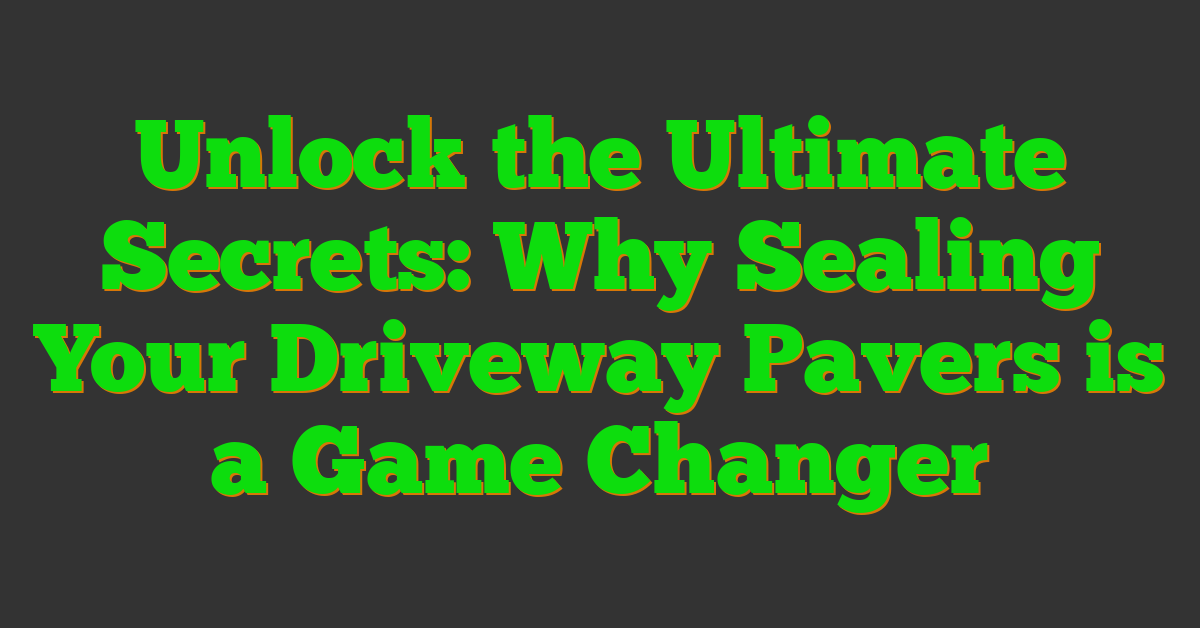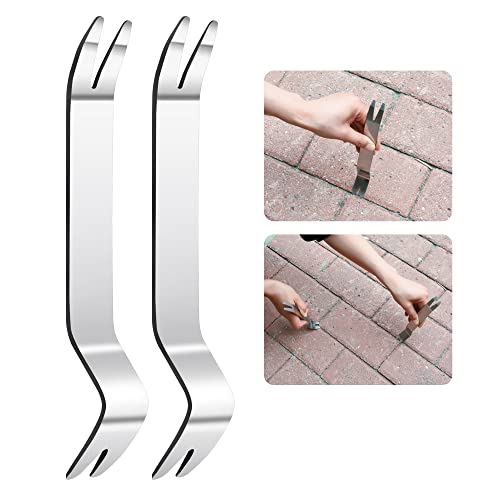When it comes to enhancing the longevity and appearance of your driveway, the question of whether driveway pavers should be sealed often arises. Sealing your driveway pavers can offer a range of benefits that go beyond just aesthetics.

Not only does sealing help protect the pavers from stains, oil spills, and weather damage, but it can also make maintenance easier in the long run. By creating a protective barrier, sealing can prevent weed growth between the pavers and inhibit the growth of mold and mildew.
In this article, we’ll delve into the reasons why sealing your driveway pavers might be a wise investment and explore the different types of sealants available. Join us as we uncover the advantages of sealing your driveway pavers and how it can contribute to the overall appeal and durability of your outdoor space.
Understanding Driveway Pavers
As landscape designers, we understand the significance of driveway pavers in creating functional and aesthetically pleasing outdoor spaces. When it comes to driveway pavers, there are various types to consider, each offering unique characteristics and benefits that cater to different needs and styles.
Types of Driveway Pavers
When selecting driveway pavers, it’s essential to explore the range of options available to find the best fit for the design and purpose of the space. Common types of driveway pavers include concrete, brick, natural stone, and permeable pavers. Concrete pavers are versatile and durable, while brick pavers exude a classic charm. Natural stone pavers add a luxurious touch, and permeable pavers promote eco-friendly water drainage.
The Importance of Driveway Maintenance
Maintaining driveway pavers is crucial for preserving their functionality and visual appeal over time. Regular maintenance not only extends the lifespan of the pavers but also ensures a safe and welcoming entrance to your property. Proper maintenance practices include cleaning, weed control, and addressing any repairs promptly to prevent further damage. By investing time and effort in driveway maintenance, we can enhance the durability and aesthetics of outdoor spaces, creating a lasting impression for years to come.
The Debate: To Seal or Not to Seal?
Benefits of Sealing Driveway Pavers
As landscape designers, we often consider sealing driveway pavers as a beneficial practice. Sealing provides a protective layer that enhances the durability of the pavers by guarding against stains, oil spills, harsh weather conditions, as well as inhibiting weed growth and mold formation. By sealing driveway pavers, we not only ensure their longevity but also maintain the aesthetic appeal of outdoor spaces. The sealed surface is easier to clean and maintain, adding to the overall charm of the property entrance.
Potential Drawbacks of Sealing
While sealing driveway pavers offers numerous advantages, there are also potential drawbacks to consider. One of the main concerns is that sealed pavers may become slippery, especially when wet. This slipperiness can pose a safety hazard, particularly in areas prone to rain or near swimming pools where water splashing is common. Additionally, some homeowners prefer the natural look of unsealed pavers, as sealing can alter the appearance of certain materials like natural stone or brick. It’s essential to weigh these considerations carefully before deciding whether to seal driveway pavers based on the specific needs and preferences of each outdoor space.
Sealing Driveway Pavers: The Process
As landscape designers, we understand the importance of maintaining the allure and functionality of outdoor spaces through proper care and maintenance of driveway pavers. When it comes to protecting driveway pavers against stains, oil spills, weather damage, weed growth, and mold, sealing them can be a beneficial practice. While there is an ongoing debate on whether driveway pavers should be sealed, we believe that sealing can significantly enhance the durability and aesthetics of the outdoor areas we design. However, it’s essential to consider specific factors before making a decision, taking into account individual preferences and needs.
Preparing the Pavers for Sealing
Before applying a sealer to driveway pavers, proper preparation is key to ensure optimal results. We recommend following these steps to prepare the pavers for sealing:
- Cleaning: Start by thoroughly cleaning the driveway pavers to remove any dirt, debris, or stains. Use a pressure washer or suitable cleaning solution to achieve a clean surface.
- Repairs: Inspect the pavers for any damage, such as cracks or chipped areas. Make necessary repairs to ensure the pavers are in good condition before sealing.
- Drying: Allow the pavers to dry completely before applying the sealer. Moisture on the surface can affect the sealer’s effectiveness.
By preparing the driveway pavers adequately, we can ensure that the sealer adheres well and provides long-lasting protection.
Choosing the Right Sealer
Selecting the appropriate sealer is crucial to achieve the desired results and protect the driveway pavers effectively. Consider the following factors when choosing a sealer:
- Type: Decide between penetrating sealers that soak into the pavers or film-forming sealers that create a protective layer on the surface.
- Finish: Choose between a natural look sealer that maintains the pavers’ appearance or an enhancing sealer that adds a glossy finish.
- Durability: Opt for a high-quality sealer that offers durability against stains, UV rays, and other external elements.
By selecting the right sealer for the driveway pavers, we can ensure optimal protection and enhance the overall look of the outdoor space.
Application Tips for Best Results
To achieve the best results when sealing driveway pavers, follow these application tips:
- Temperature: Apply the sealer when the temperature is ideal for curing, usually between 50°F and 80°F.
- Coverage: Ensure even coverage of the sealer to prevent streaks or uneven finish.
- Drying Time: Allow the sealer to dry completely between coats as per the manufacturer’s instructions.
- Maintenance: Regularly maintain the sealed driveway pavers by cleaning them and reapplying the sealer as needed to prolong their longevity.
Following these tips will help us achieve a well-sealed and protected driveway surface that enhances both the aesthetics and durability of the outdoor space we design.
Maintenance Tips for Sealed Driveway Pavers
Regular Cleaning Practices
As landscape designers, we understand the importance of regular maintenance to upkeep the beauty and functionality of driveway pavers. To keep sealed driveway pavers looking their best, it’s crucial to establish a routine cleaning schedule. We recommend sweeping the surface regularly to remove debris and prevent dirt buildup. Additionally, gentle washing with a garden hose or pressure washer can help maintain the cleanliness of the pavers, keeping them free of dirt and grime. By incorporating these simple cleaning practices into your routine, you can extend the longevity of your driveway pavers and preserve their visual appeal.
Stain Removal and Repair
Stains and blemishes can detract from the overall appearance of sealed driveway pavers. As experienced landscape designers, we advise addressing stains promptly to prevent permanent damage. For oil-based stains, applying an absorbent material like cat litter can help lift the stain before cleaning with a suitable detergent. For grease stains, using a degreaser specifically formulated for pavers can effectively remove the blemish. In cases of stubborn stains, professional cleaning services may be necessary to restore the pavers’ pristine look. Regularly inspecting and repairing any damaged pavers, such as cracks or chips, is also essential to prevent further deterioration and maintain the structural integrity of your driveway.
Factors to Consider Before Sealing
As landscape designers, we understand the importance of considering various factors before deciding to seal driveway pavers. The key aspects to keep in mind are climate and weather exposure, traffic and usage patterns, as well as aesthetics and design considerations.
Climate and Weather Exposure
When contemplating whether to seal driveway pavers, it’s crucial to assess the climate and weather conditions in your area. Different climatic factors such as extreme heat, heavy rainfall, freezing temperatures, and UV exposure can impact the durability of pavers. Sealing can offer protection against such elements, preventing premature wear and maintaining the pavers’ appearance over time.
« Unveiling the Ultimate Guide to Pavers Patios: Everything You Need to Know Revamp Your Wooden Deck with Pavers: A Complete Installation Guide »
Traffic and Usage Patterns
Another significant factor to ponder is the amount of traffic and the specific usage patterns of the paved area. High traffic areas like driveways or pathways used frequently by vehicles or foot traffic may benefit greatly from sealing. Sealed pavers are more resistant to stains, oil spills, and general wear and tear caused by regular use. Understanding the intensity of usage can help determine the necessity of sealing for long-term maintenance.
Aesthetics and Design Considerations
Consider the aesthetic appeal and design elements of your outdoor space when contemplating sealing driveway pavers. Sealed pavers often have a enhanced color vibrancy and a glossy finish that can elevate the overall look of your landscape. Additionally, sealing can help in preserving the original design intent of the pavers, providing a polished and cohesive appearance to the outdoor area. Factor in your design preferences and desired aesthetic outcomes when making a decision about sealing driveway pavers.
By carefully evaluating these factors, we can make informed decisions regarding the sealing of driveway pavers to ensure longevity, visual appeal, and functional durability in outdoor spaces.
Conclusion
Sealing driveway pavers can significantly enhance their lifespan and overall look. By considering factors like climate, usage, and design, we can make informed choices to protect our outdoor spaces. Properly sealed pavers not only resist damage but also elevate the aesthetics of our driveways. Remember, the key is to select the right sealer and follow the application guidelines for optimal results. Ultimately, sealing driveway pavers is a valuable investment that ensures durability and visual appeal for years to come.








